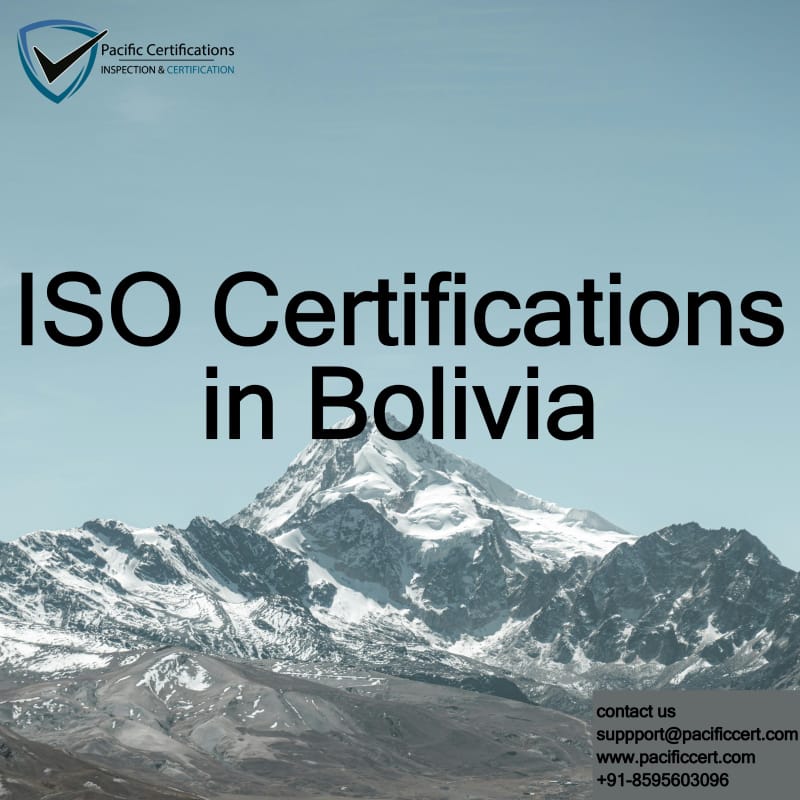ISO Certifications in Bolivia, Popular Standards, Requirements and Benefits

Introduction
ISO certifications play a crucial role in enhancing the quality, safety, and efficiency of products and services across various industries worldwide. These certifications are based on international standards developed by the International Organization for Standardization (ISO), aiming to ensure that organizations meet the requirements of customers and other stakeholders while meeting statutory and regulatory requirements related to the product or service.
In Bolivia, as in other countries, ISO certifications are sought after by organizations looking to improve their operations, comply with international standards, and gain a competitive edge in the market.
ISO Certifications in Bolivia
In Bolivia, organizations from various sectors pursue ISO certifications to demonstrate their commitment to quality, environmental management, information security, occupational health and safety, and other key areas of operation. Some of the most applicable and widely recognized ISO standards in Bolivia include:
ISO 9001:
This is the international standard for quality management systems (QMS). It helps organizations ensure they meet customer and other stakeholder needs within statutory and regulatory requirements related to a product or service.
ISO 14001:
This standard outlines the criteria for an effective environmental management system (EMS), providing a framework that an organization can follow, rather than establishing environmental performance requirements.
ISO 45001:
ISO 45001 specifies requirements for an occupational health and safety (OH&S) management system, and gives guidance for its use, to enable organizations to provide safe and healthy workplaces.
ISO 27001:
This standard specifies the requirements for establishing, implementing, maintaining, and continually improving an information security management system (ISMS).
ISO 22000:
Focused on food safety management, this standard sets out the requirements for a food safety management system and can be certified to it. It maps out what an organization needs to do to demonstrate its ability to control food safety hazards in order to ensure that food is safe.
Click here to find out more applicable standards to your industry
How Pacific Certifications Can Assist with Audit & Certification in Bolivia?
Pacific Certifications, accredited by ABIS to issue management system certifications such as ISO 9001, ISO 14001, ISO 45001, ISO 27001, and product certifications like CE, HACCP, GMP, etc., offers comprehensive services to assist organizations in Bolivia with obtaining ISO certifications. Here's how We at Pacific Certifications can help:
Gap Analysis:
Initially, We can conduct a gap analysis to understand your organization's current position relative to the requirements of the desired ISO standard. This helps identify areas that require improvement before formal assessment.
Training:
Pacific Certifications provides training for your staff to understand the ISO standards’ requirements thoroughly. This includes awareness training, internal auditor training, and specific training related to the implementation of the management system.
Documentation Support:
We can assist in developing the necessary documentation that complies with ISO standards, ensuring that all required policies, procedures, and records are properly established.
Implementation Assistance:
Guidance during the implementation of the necessary processes and controls required by the ISO standards can significantly enhance the effectiveness of your management system.
Pre-assessment Audit:
Before the formal certification audit, a pre-assessment can be conducted to identify any areas of non-compliance or opportunities for improvement, allowing your organization to address these issues proactively.
Certification Audit:
Pacific Certifications can conduct the formal audit in two stages—initial assessment to review the management system's documentation and a more detailed assessment to ensure that the management systems effectively conform to the standard requirements.
Continuous Support:
After certification, Pacific Certifications offers support to ensure that your organization continues to meet the standards, including surveillance audits and re-certification services.
For organizations in Bolivia looking to achieve or maintain ISO certifications, partnering with a knowledgeable and experienced certification body like Pacific Certifications can streamline the process, reduce the time to certification, and enhance the overall effectiveness of the management system.
This not only helps in meeting the statutory and regulatory requirements but also improves process efficiency, reduces waste, and increases customer satisfaction.
Requirements of ISO Certifications in Bolivia
The requirements for obtaining ISO certifications in Bolivia align with the international standards set by the International Organization for Standardization (ISO). While the specific requirements can vary depending on the type of ISO certification an organization seeks, there are general steps and requirements that apply to most ISO standards.
Below, we'll outline some of the common requirements and processes organizations in Bolivia (or any other country) would need to fulfill to achieve ISO certification, focusing on popular standards like ISO 9001 (Quality Management Systems), ISO 14001 (Environmental Management Systems), ISO 45001 (Occupational Health and Safety Management Systems), and ISO 27001 (Information Security Management Systems).
Benefits of ISO Certifications in Bolivia
ISO certifications in Bolivia, as in other countries, bring a wide array of benefits to organizations across various sectors, from manufacturing and services to IT and food safety. These certifications are based on standards developed by the International Organization for Standardization (ISO), which provide frameworks for improving quality, safety, efficiency, and customer satisfaction.
Achieving ISO certification is not just about meeting a set of requirements; it's about embedding a culture of continuous improvement and excellence within an organization. Below, we explore the key benefits of obtaining ISO certifications for organizations in Bolivia:
Enhanced Quality and Efficiency
- Quality Management (ISO 9001): This certification helps organizations ensure their products and services consistently meet customer and regulatory requirements. It promotes the adoption of a process approach and continual improvement, leading to higher operational efficiency and product quality.
- Operational Efficiency: ISO standards require organizations to identify, document, and optimize their processes. This leads to more efficient use of resources, reduced waste, and cost savings, enhancing overall operational efficiency.
Access to New Markets
- Global Recognition: ISO certifications are recognized and respected worldwide. For Bolivian companies looking to expand into international markets, having ISO certifications can be a critical factor in gaining access to new customers and business partners who require suppliers to meet these standards.
- Compliance with Regulations: Many industries have specific regulatory requirements that can be addressed by implementing ISO standards, thereby facilitating compliance and reducing the risk of penalties or legal issues.
Improved Customer Satisfaction and Trust
- Meeting Customer Expectations: By ensuring consistent quality and reliability of products and services, organizations can meet or exceed customer expectations, leading to higher customer satisfaction and loyalty.
- Enhanced Brand Image: ISO certification demonstrates an organization’s commitment to quality, safety, and reliability, enhancing its reputation and brand image. This can be a significant competitive advantage in crowded markets.
Better Risk Management
- Identification and Mitigation of Risks: ISO standards such as ISO 27001 (Information Security Management) and ISO 45001 (Occupational Health and Safety) require organizations to identify potential risks to information security and worker safety, respectively, and implement preventive measures. This proactive approach to risk management can protect the organization from potential crises and financial losses.
Environmental and Social Responsibility
- Environmental Management (ISO 14001): This certification helps organizations minimize their environmental impact, comply with applicable laws and regulations, and achieve their environmental objectives. It demonstrates a commitment to sustainable development and social responsibility, which is increasingly valued by customers, investors, and other stakeholders.
- Social Responsibility: By adopting ISO standards, organizations can also demonstrate their commitment to ethical practices, worker safety, and community welfare, which can improve stakeholder relationships and contribute to a positive corporate image.
Continuous Improvement
- Culture of Excellence: ISO standards are based on the principle of continuous improvement, requiring organizations to regularly assess and enhance their processes. This fosters a culture of innovation and excellence, driving long-term success.
For organizations in Bolivia, achieving ISO certification is not just a badge of honor, it is a strategic tool that can drive business growth, operational excellence, and sustainable development. The benefits extend beyond compliance and efficiency to encompass improved stakeholder relationships, enhanced competitiveness, and a stronger foundation for future growth.
Which Industries Need ISO Certifications in Bolivia?
ISO certifications are versatile and applicable across a broad range of industries worldwide, including in Bolivia. These certifications are designed to ensure organizations meet the highest standards for quality, safety, efficiency, environmental management, information security, and more.
While virtually any organization can benefit from ISO certifications, certain industries find these certifications particularly critical due to the nature of their operations, regulatory requirements, or market expectations. Here are some of the industries that commonly require or benefit significantly from ISO certifications in Bolivia:
Manufacturing
- Quality Management (ISO 9001): Ensures consistent production quality and efficiency.
- Environmental Management (ISO 14001): Helps in minimizing environmental impacts and complying with regulations.
Information Technology
- Information Security Management (ISO/IEC 27001): Critical for protecting data and ensuring privacy and integrity in IT operations.
Construction and Engineering
- Quality Management (ISO 9001): Ensures projects are completed to specifications, on time, and within budget.
- Occupational Health and Safety Management (ISO 45001): Essential for reducing accidents and creating safer work environments.
Food Industry
- Food Safety Management (ISO 22000): Ensures the safety and quality of food products, from production to consumption.
- Environmental Management (ISO 14001): Helps manage environmental impacts of food production and processing.
Healthcare
- Quality Management (ISO 9001): Improves patient care quality and operational efficiency.
- Information Security Management (ISO/IEC 27001): Protects patient data and ensures confidentiality.
Education
- Quality Management (ISO 9001): Enhances the quality of education and administrative processes.
Energy and Utilities
- Environmental Management (ISO 14001): Critical for managing environmental impact and promoting sustainability.
- Energy Management (ISO 50001): Helps organizations in improving energy efficiency and reducing environmental impact.
Agriculture
- Food Safety Management (ISO 22000): Ensures safety and quality in the agricultural and food production processes.
- Environmental Management (ISO 14001): Supports sustainable farming practices and environmental stewardship.
Tourism and Hospitality
- Quality Management (ISO 9001): Enhances customer satisfaction and service quality.
- Environmental Management (ISO 14001): Promotes sustainable tourism practices.
Logistics and Transportation
- Quality Management (ISO 9001): Improves efficiency and reliability in logistics operations.
- Environmental Management (ISO 14001): Minimizes environmental impacts of transportation and logistics activities.
These industries benefit from ISO certifications by not only meeting regulatory and customer requirements but also improving operational efficiency, reducing costs, enhancing customer satisfaction, and contributing positively to the environment and society.
Conclusion
In Bolivia, as in other countries, the adoption of ISO certifications can also facilitate international trade and competitiveness, as these certifications are globally recognized markers of quality and reliability.
Pacific Certifications is accredited by ABIS, in case you need support with ISO certification for your business in Bolivia, please contact us at [email protected] or +91-8595603096.
Ready to get ISO certified?
Contact Pacific Certifications to begin your certification journey today!
Suggested Certifications –
Read more: Pacific Blogs

